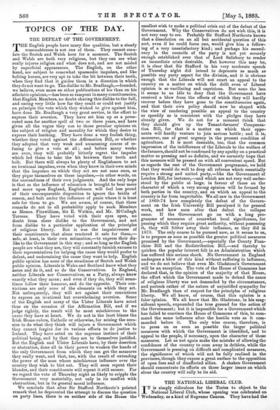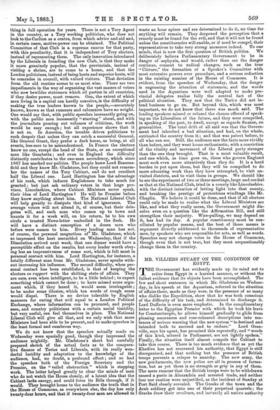THE NATIONAL LIBERAL CLUB.
IT is simply ridiculous for the Tories to object to the National Liberal Club, whose opening was celebrated on Wednesday, as a kind of Supreme Caucus. They have had the thing in full operation for years. There is not a Tory Agent in the country, or a Tory working politician, who does not look to the Carlton as a centre, from which advice and aid and, in certain cases motive-power can be obtained. The Political Committee of ;hat Club is a supreme caucus for that party, with this peculiarity, that it is independent of Tory electors, instead of representing them. The only innovation introduced by the Liberals in founding the new Club, is that they make it more genuinely popular, that the provincials, instead of visiting a shrine, are to come to a home, and that the London politicians, instead of being hosts and superior hosts, will be comrades in council, with valued visitors. That deviation from the old routine seems to us most wise. There are two impediments in the way of organising the vast masses of voters who now bewilder statesmen which all parties in all countries, if they desire power, must remove. One, the extent of which men living in a capital can hardly conceive, is the difficulty of making the true leaders known to the people,—accurately known, known so that rumours and calumnies have no weight. One would say that, with public speeches incessantly going on, with the public men incessantly " starring " about, and with the journalists pouring out volumes of criticism, the work would be easy enough ; but all experience shows that it is not so. In America, the trouble drives politicians to such despair that unless they can catch a successful General, like General Grant, they prefer a dark horse, as being, at all events, less sure to be misunderstood. In France the electors know no one, except the head of the State, or an exceptional man like Gambetta ; and even in England the difficulty distinctly contributes to the one-man ascendency, which since 1867 has marked our politics. The people knew Lord Beacons- field and they know Mr. Gladstone, but they could not remem- ber the names of the Tory Cabinet, and do not recollect half the Liberal one. Lord Hartington has the advantage of his rank, which induces Englishmen to take much for granted ; but just ask ordinary voters in that huge pro- vince, Lincolnshire, where Cabinet Ministers never speak, their idea of Lord Hartington ? He will be Premier before they know anything about him. The National Liberal Club will help greatly to dissipate that kind of ignorance. The average voters will not attend it, of course, but their dele- gates will, and each man who comes up to town and haunts it for a week will, on his return, be to his own circle a trusted News-letter embodied in the flesh. He will have a distinct conception of a dozen men who before were names to him. Every leading man has not, of course, the personal magnetism or Mr. Gladstone, which so impressed the host assembled on Wednesday, that if the Dissolution arrived next week, that one dinner would have a perceptible effect on the results, but every leader worth obey- ing has an impressiveness of some sort, which is felt most in personal contact with him. Lord Hartington, for instance a totally different man from Mr. Gladstone, never speaks with- out increasing his influence. The second difficulty, when per- sonal contact has been established, is that of keeping the electors en rapport with the shifting state of affairs. They are sure, even when intelligent, to be a little behind ; to expect something which cannot be done ; to have missed some argu- ment which, if they heard it, would seem irrefragable ; to be under some illusion, which ten words of rough sense would dispel. There is no device tolerable by English manners for curing that evil equal to a London Political Exchange, where information can be procured, and people seen, and country politicians with a certain social timidity, but very useful, can feel themselves in place. The National Liberal Club will give all that, and we only wish that more Ministers had been able to be present, and to make speeches in the least formal and cumbrous way.
We do not know that the speeches actually made on Wednesday were specially good, though they impressed the audience mightily. Mr. Gladstone's short but carefully prepared sketch of the actual facts as to the compara- tive finance of Tories and Liberals, with its really won- derful lucidity and adaptation to the knowledge of the audience, had, no doubt, a profound effect ; and so had the speeches both of the Foreign Secretary and the Premier, on the "veiled obstruction" which is stopping work. The latter helped greatly to clear the minds of men who do not watch the House closely, of a latent idea that the Cabinet lacks energy, and could force its Bills through, if it would. They brought home to the audience the truth that in the House of Commons, as everywhere else, the day has only twenty-four hours, and that if twenty-four men are allowed to waste an hour apiece and are determined to do it, no time for anything will remain. They deepened the perception that a remedy must be found for the evil, and that it will not be found unless the constituencies will enable, or if need be compel, their representatives to take very strong measures indeed. To our
minds, that is now the first question of British politics. We deliberately believe Parliamentary Government to be in danger of asphyxia, and would, rather than see the danger continue, consent to radical changes, such as the true Cloture," the formation of a Speaker's Committee with most extensive powers over procedure, and a serious reduction in the existing number of the House of Commons. It is evident, from the speeches of Wednesday, that the danger is engrossing the attention of statesmen, and the words used in the Aquarium were well adapted to make pro- vincial delegates realise fully the central fact of the political situation. They saw that the Tories did not in- tend business to go on. But beyond this, which was most important, we do not know that there was much said. The leading speakers missed or refused the chance offered of speak- ing on the Liberalism of the future, and they were compelled, in speaking of the past, to dwell, except as regards finance, on generalities. The total drift of all said was that the Govern- ment had inherited a had situation, and had, on the whole, extricated the country from it ; and that was patent before, to all who can see. Still, the audience saw the facts more vividly than before, and they went home enthusiastic, with a conviction of the vitality and movement of the Liberal party stronger than the one they brought. That is a most valuable result, and one which, as time goes on, those who govern England must seek even more attentively than they do. It is a hard burden to put upon them, but they will be compelled to do more educating work than they have attempted, to visit un- visited districts, and to visit them in groups. We should like to see the experiment of two or three meetings, large and cordial as that at the National Club, tried in a county like Lincolnshire, with the distinct intention of letting light into that county, and breaking the prestige of pretentious windbags like Mr. Chaplin. We believe it could be done, and that if all electors could only be made to realise what the Liberal Ministers are like, and what they really mean, the Government might dis- solve even on a question like the Affirmation Bill, and still strengthen their majority. Wire-pulling, we may depend on it, has had its day. A popular constituency must be con- ciliated by popular means, and the best of those means is argument directly adddressed to thousands of representative men, by speakers who are responsible for acts, as well as words. Speeches may not change votes in the House of Commons, though even that is not true, but they most unquestionably change them in the country.



































 Previous page
Previous page